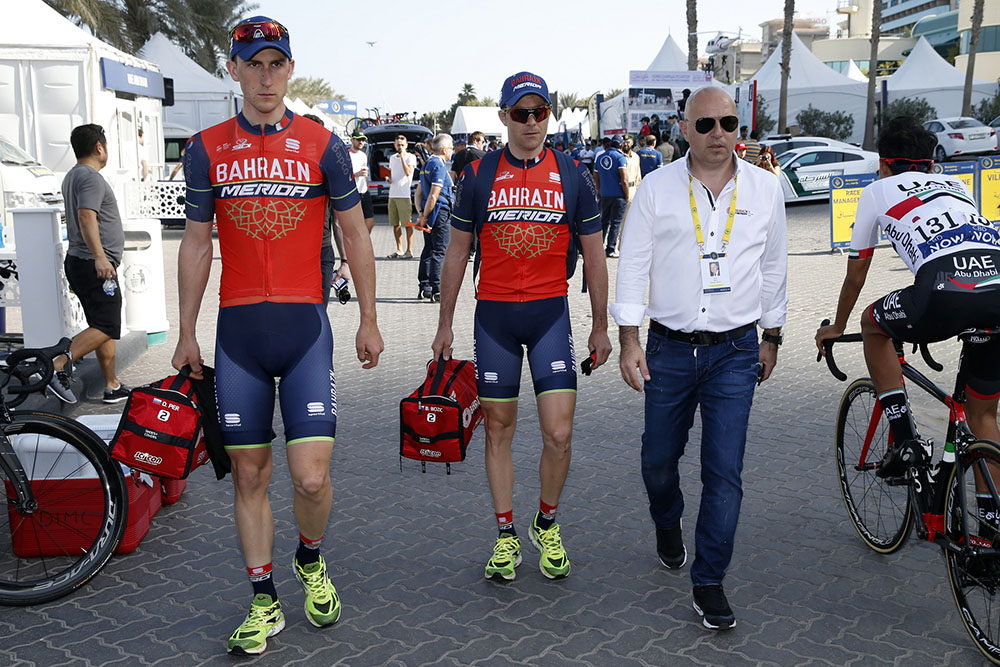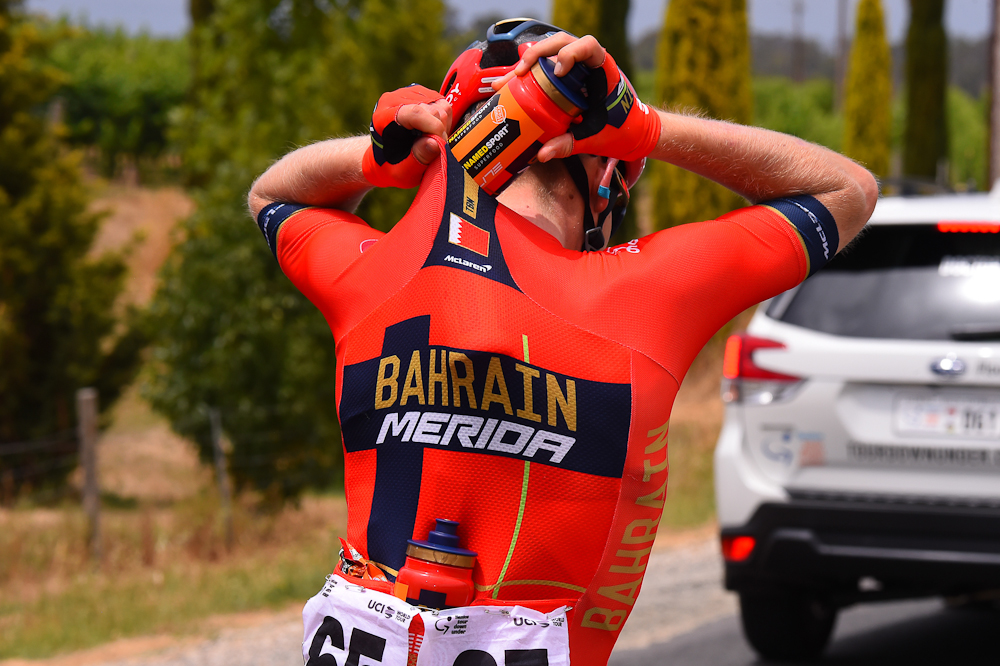Bahrain-Merida's Milan Erzen under UCI investigation
Managing director linked to Slovenian connection within Operation Aderlass


The Union Cycliste Internationale (UCI) is investigating a Slovenian cycling connection to the Operation Aderlass blood doping ring, with Milan Eržen, the current managing director at Bahrain-Merida, at the centre of their attention.
Denifl confesses to blood doping in police interview
Preidler admits to blood extraction as doping investigation widens
UCI provisionally suspends Preidler and Denifl after blood doping confessions
'More chapters to be written' in Operation Aderlass, says state prosecutor
Petacchi, Koren, Durasek, Bozic named in Aderlass doping ring
Nibali 'disappointed' by Koren's implication in Aderlass doping inquiry
Roglic: Slovenian riders' involvement in Aderlass doping investigation is 'sad'
More damaging questions as links uncovered between Erzen and Aderlass doping doctor
Polanc: I'm proud to be Slovenian
Austrian doping: A complete history of Operation Aderlass
Roglic and Nibali left to face questions over Milan Erzen and his links to Operation Aderlass
The UCI has confirmed to Cyclingnews that since 2015 it has been carefully following the activities of several Slovenian individuals, including riders, rider support personnel and team management staff for potential roles in a number of different investigations, even before Operation Aderlass emerged.
According to a recent profile by the Corriere della Sera newspaper in Italy, Eržen is considered the Dominus of Slovenian cycling. Cyclingnews approached Bahrain-Merida for a comment from Eržen, who responded through the team saying, "All and any implications regarding my involvement in Aderlass are absolutely false and unfounded."
Eržen, who has yet to receive any notification from the UCI, helped create the Bahrain-Merida team for Prince Nasser bin Hamad Al Khalifa of Bahrain after helping him train for an Ironman triathlon in 2013. In an interview with Slovenian website Polet.delo.si, Eržen boasts how he went on to introduce modern training methods to the prince’s horse racing stable, including the use of altitude chambers. He then helped developed a triathlon team and organise an Ironman event in Bahrain and responded to the prince’s desire for a WorldTour team by signing Vincenzo Nibali and creating the Bahrain-Merida team for the 2016 season.
Eržen keeps a low profile and has changed his job title at Bahrain-Merida several times after the UCI insisted he hold a team staff licence. He currently has a class 8 UCI staff licence – the lowest of the UCI categories - but he is the de facto boss of the team due to his close links to Prince Nasser bin Hamad Al Khalifa. He is known within the current team as the managing director.
Slovenian cycling is small compared to other nations but has risen to 10th place in the UCI World nations ranking, thanks to the success of Primoz Roglic (Jumbo-Visma), Simon Spilak (Katusha-Alpecin), Matej Mohoric (Bahrain-Merida) and, most recently, 20-year-old Tadej Pogačar (UAE Team Emirates), who won the Tour of California last week.
Eržen raced until 2002 with the Slovenian KRKA Telecom team before becoming a talent scout, coach, altitude training expert, rider agent and manager. He discovered and developed Janez Brajkovic, helping him win the 2004 Under-23 world time trial title ahead of Thomas Dekker and Nibali. Brajkovic went on to join Lance Armstrong’s Discovery Channel team in 2005. He raced for Bahrain-Merida in 2017 and then Adria Mobil in 2018 until testing positive for Methlyhexanamine. He was banned by the UCI.
Get The Leadout Newsletter
The latest race content, interviews, features, reviews and expert buying guides, direct to your inbox!
Many of the 32 Slovenian riders in the professional peloton have been helped in some way or another by Eržen, including current Giro d’Italia favourite Primoz Roglic, who raced for Eržen’s Adria Mobil Continental team between 2013 and 2015 before moving to what is now Jumbo-Visma.
There are six Slovenian riders on the Bahrain-Merida roster, plus head sports director and former rider Goradz Stangelj, sports director and former rider Borut Bozic, team doctor Marjan Korsic, and other staff.
Last Wednesday the UCI moved quickly to suspend Bozic and current Bahrain-Merida rider Kristijan Koren, along with Kristijan Durasek and Alessandro Petacchi, for their links to Operation Aderlass after details of the Europol police investigation were published by Corriere della Sera and Le Monde.
Bahrain-Merida were forced to send Koren home from the Giro d’Italia and suspend Bozic from his role as sports director. Durasek was sent home from the Tour of California by his UAE Team Emirates squad. He is from Varaždin in Croatia, close to the border with Slovenia and knows many of the Slovenian riders after racing for the Perutnina Ptuj team and under Eržen at the Adria Mobil team.
Operation Aderlass and Dr. Schmidt
Operation Aderlass – Operation Bloodletting in English – emerged during the Nordic Ski World Championships in Seefeld, Austria, in late February, where five cross country skiers were arrested as part of the inquiry into the blood doping activities of German doctor Mark Schmidt.
Stefan Denifl, formerly of Aqua Blue Sport, and Georg Preidler of Groupama-FDJ quickly admitted to blood doping, while at least 40 bags of blood and transfusion equipment was discovered in a garage in Erfurt, east of Munich. Schimdt was one of four people arrested and remains in jail but has apparently revealed details of his blood doping ring and his clients. On March 20 German investigators revealed that 21 athletes from five different sports and eight different countries were involved.
UCI president David Lappartient made a surprise visit to the Giro d’Italia at the weekend, with La Gazzetta dello Sport reporting he met with Bahrain-Merida team management in the absence of Eržen.
Lappartient confirmed that other people, especially from Slovenia and neighbouring Croatia, have been caught up in the UCI investigation into Operation Aderlass.
"For now, there aren't the names of other riders in the dossier," Lappartient told La Gazzetta dello Sport.
"The area of Slovenia and Croatia is under close observation, there are riders and managers involved in situations that the UCI is following closely. I hope the national anti-doping agencies of these countries help us and invest more money and resources."
According to Le Monde, eight out of 19 riders (42 per cent) who have raced at WorldTour level in the last decade have been suspended for doping. While Germany and Austria have strict doping laws, which has lead to Operation Aderlass, Slovenia and neighbouring Croatia are considered a safe haven for doping. The trafficking of doping products and helping with doping is illegal but blood doping is not a crime.
When he confessed to blood doping and links to Dr. Schmidt, Danilo Hondo revealed that the German doctor contacted him via what he believed was a Slovenian or Croatian mobile telephone number.
"Unfortunately, we’ve had quite a lot of positive cases," Janko Dvorsak the president of the Slovenian anti-doping agency told Le Monde. "Without a doubt it’s because of the proximity to Italy, where a lot of riders head to. It’s not the country where you come from that counts but the team you move on to."
Last week Roglic described the Slovenian connection to Operation Aderlass as 'sad'.
During Monday’s rest day at the Giro d'Italia, La Gazzetta dello Sport asked him again.
"What has happened is bad for Slovenian cycling. It’s shit these thing happen. But I can walk with my head high and so can the new generation of riders. We’re a good example," he said.

Stephen is one of the most experienced member of the Cyclingnews team, having reported on professional cycling since 1994. He has been Head of News at Cyclingnews since 2022, before which he held the position of European editor since 2012 and previously worked for Reuters, Shift Active Media, and CyclingWeekly, among other publications.